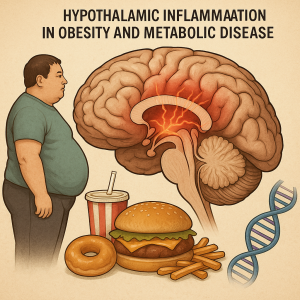In their 2017 article, Hypothalamic Inflammation in Obesity and Metabolic Disease, researchers Jais and Brüning looked at how the hypothalamus becomes inflamed in people with obesity. The hypothalamus helps control hunger and how the body uses energy. The authors explain that when we eat too much high-fat/high-sugar food, it can trigger inflammation in this part of the brain. This inflammation makes it harder for the brain to properly regulate appetite and metabolism, which can lead to more weight gain and increase the risk of diseases like type 2 diabetes. Their work shows that obesity is not just about eating too much, but also about how the body, especially the brain, responds to what we eat [1].
Why Are We Talking About Genes and Obesity?
Obesity is a global problem, affecting millions of people [2]. While it’s easy to blame fast food or lack of exercise, scientists have found that there’s much more to the story. One important piece of that story is our genes. They are tiny instructions in our DNA that help shape how our bodies work. Some people have genetic differences that can make them more likely to gain weight, even when they try to eat well and stay active. Understanding the role of genes and brain inflammation helps explain why some people struggle more than others, and it opens the door to better, more personalized treatments.
But even though we know genes and brain inflammation play a role together, scientists still don’t fully understand how these processes work together. There are many different genes involved, and they don’t all act the same way in every person. Treatments that target inflammation in the brain are still in the early stages, and more research is needed to figure out what works and what doesn’t. This makes it a big challenge, but also an exciting area for new discoveries.

What are the Specific Genetic Defects?
Genetic obesity happens when a change in just one gene causes serious weight problems, often starting in early childhood. These changes affect parts of the brain, especially the hypothalamus, that control hunger and how the body uses energy. For example, a mutation in the LEP gene can cause a lack of leptin, a hormone that helps control appetite, leading to constant hunger and rapid weight gain. This can sometimes be treated with leptin replacement therapy. Other genes, like LEPR, stop the body from responding to leptin, even if it’s there. The MC4R gene, the most common cause of single-gene obesity, affects signals that tell the brain when you’re full. Mutations in POMC and PCSK1 can cause more complex problems, like hormone imbalances and poor energy control. All of these genes play a role in key brain pathways that manage appetite, energy use, and even how much we enjoy food [3].
Where Do We Go From Here?
Research like this shows us that obesity can be caused by more than just eating too much- it can also be linked to brain changes and inflammation. Certain genetic differences can make some people more vulnerable to these changes. By understanding these processes, scientists can begin to develop treatments that go beyond diet and exercise. They can hopefully provide treatments that actually target the brain and genes involved. This opens up new possibilities for helping people with obesity in a way that’s more effective and more fair.
Science and Real Life
This research matters because it shifts how we think about obesity. It reminds us that weight gain isn’t just a personal failure- sometimes, it’s biology, and that changes everything. If doctors and society can better understand the real causes behind obesity, we can create more compassionate healthcare and offer personalized treatment plans, all the while reducing the stigma that people with obesity often face.

[1] Jais, A., & Brüning, J. C. (n.d.). Hypothalamic inflammation in obesity and metabolic disease. The Journal of Clinical Investigation, 127(1), 24–32. https://doi.org/10.1172/JCI88878
[2] Guideline Development Panel for Treatment of Obesity, American Psychological Association. (2020). Summary of the clinical practice guideline for multicomponent behavioral treatment of obesity and overweight in children and adolescents. The American Psychologist, 75(2), 178–188. https://doi.org/10.1037/amp0000530
[3] Abawi, O., Wahab, R. J., Kleinendorst, L., Blankers, L. A., Brandsma, A. E., van Rossum, E. F. C., van der Voorn, B., van Haelst, M. M., Gaillard, R., & van den Akker, E. L. T. (2023). Genetic Obesity Disorders: Body Mass Index Trajectories and Age of Onset of Obesity Compared with Children with Obesity from the General Population. The Journal of Pediatrics, 262. https://doi.org/10.1016/j.jpeds.2023.113619
